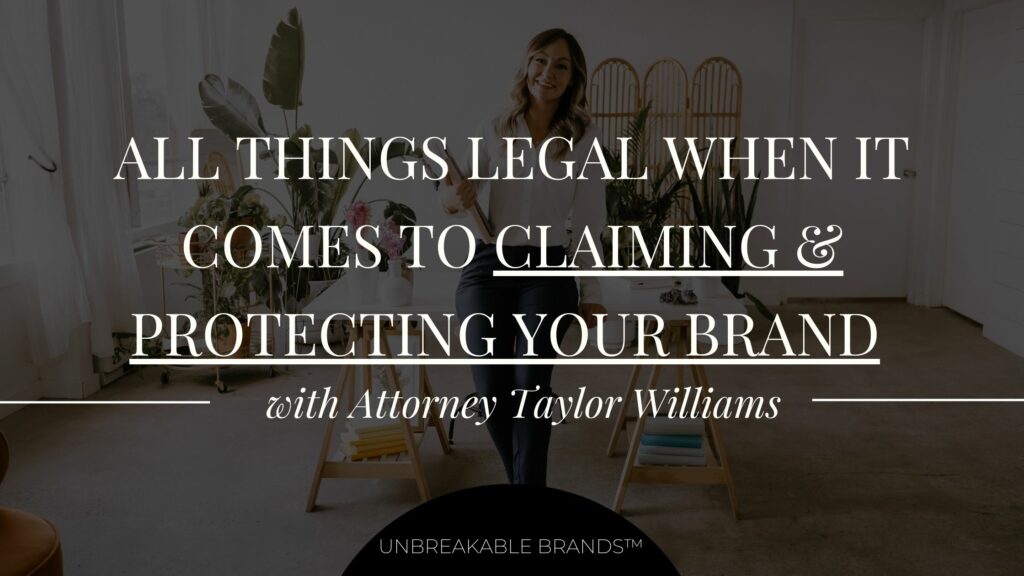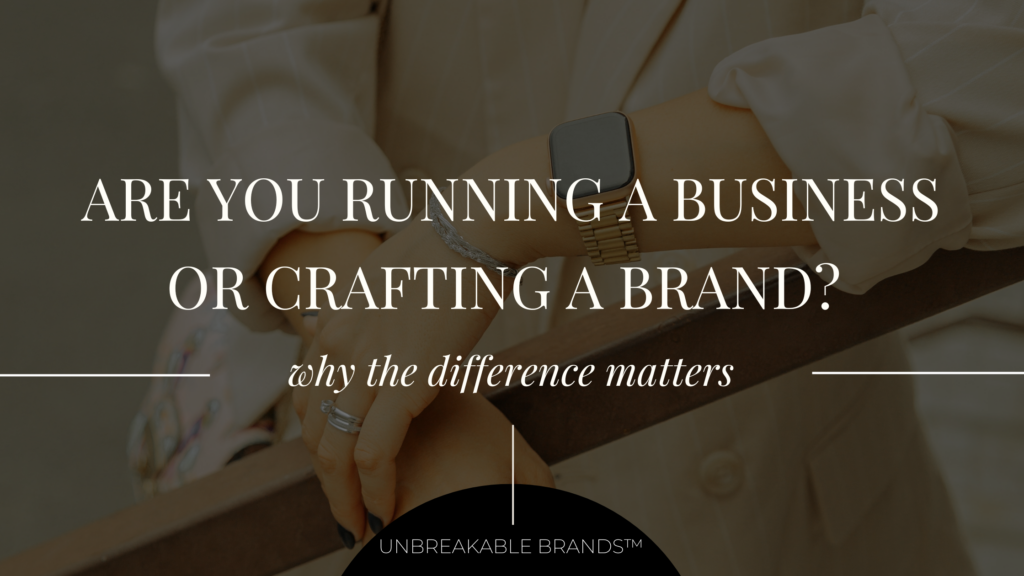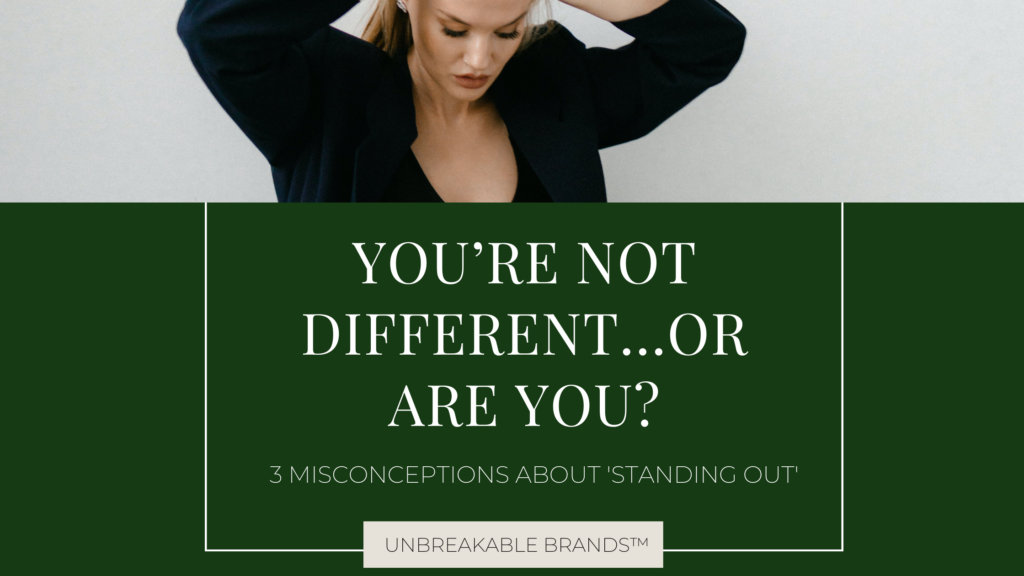We are diving into all things legal when it comes to claiming and protecting your brand today with attorney Taylor Williams.
DISCLAIMER: The information contained in this podcast is not legal advice and should not be relied on as legal advice, as legal advice cannot be given without full consideration of all relevant information relating to your individual situation. This content is for general educational and informational purposes only.
Money is not the only thing that involves scaling and building a company.
– Taylor Williams, Attorney
Here’s what you can expect to hear in this episode:
- How Taylor started working with entrepreneurs to protect their brands
- What emerging entrepreneurs need legally to start their business and have a website
- Claiming your brand via trademarks and how to know if you need one
- The biggest legal mistakes Taylor sees new and old brands make all the time
- What entrepreneurs should focus on in order to build your brand (legally)
Resources Mentioned In
This Episode
Take The Brand Quiz To Unearth Your brand personality
Pop over to our brand and web design agency and take the free brand personality quiz to begin diving into your brand persona.

protect your brand
Tell me a bit about who you are and how you came to be working with entrepreneurs
I started my practice in litigation. So when I first graduated from law school, I went straight to a firm where I was dealing with large corporate and commercial disputes in the heart of a lot of that. We had some clients who had trademarks, of course, but the heart of that was going to court to argue about business disputes that that companies had with other companies or their clients.
These litigation cases took, you know, gears, and it was not an enjoyable practice; I did not love practice. It was just not productive, or I just felt there was a way better way to resolve these types of disputes, not resolve them, but I guess prevent them from happening from the very beginning.
While I was sitting in my litigation practice, every day, I day dreamed of the practice I have now, where I am working directly with business owners to help them protect their businesses and their brands before ever even having any type of dispute like this. So as I worked at that litigation firm, I planned out how I was going to make this happen.
Over years of working there, I built this practice, essentially, and finally decided to pull the plug and go full-time solo, and it says, doing that it’s been an incredible practice, I absolutely enjoy it. Now, I work directly with business owners to protect them.
Even before my practice started, I started my Instagram page. I just love sharing information about the legal side of things. A lot of the feedback I was getting was that business owners had no idea or they had never heard about this before. So I just enjoyed sharing it and hearing that feedback. My Instagram started as this little informational thing, and then just, you know, I was able to then realize that I could build a practice around it.
It is essentially a virtual Law Firm. I’m based in Colorado. I’m licensed in Colorado, but most of my clients are nationwide. So I’ve built this practice. And yeah, it seems very seamless from the time I was in litigation. But it has been a long time coming, and I absolutely love it.
Let’s dive into all things legal for your brand. At a minimum, what does the emerging entrepreneur need legally to start their business and have a website?
I’m gonna give the disclaimer that this is not legal advice. It’s just general educational, informational advice. And if you need legal advice, then you should reach out to an attorney, of course.
But generally, if you are starting your business, and you don’t really know where to start, and you know you’re in that website phase, I generally recommend starting or looking at getting a business entity; you don’t necessarily need a business entity. A lot of my clients will come to me without one in place.
But it’s something you should consider and have an idea of whether you want to, you know, be a sole proprietor or have an LLC structure before you start jumping into how you’re going to be, you know, paying for the website and things like that.
So consider that business entity itself, and then consider what name you want your business to be under. That’s going to be important because, before you start getting into the website build, you want to make sure that you have the URL and the name itself.
Select the name you want to use and run out through an attorney with a clearance search and make sure it just is clear to use, you don’t have to apply for the trademark at that time, I recommend doing it as soon as possible. But you don’t have to do it immediately.
I always recommend getting the URL itself before you ever even apply for the trademark because we see so much fraud at the USPTO where there are people who it’s their job to monitor USPTO filings. When they see that you have filed an application for a specific mark, they will go squat on that domain name. Then they’re going to come back, you know, when you’re looking for it and say, well, I’ll give it to you for $5,000, $10,000, and it’s fraud.
They shouldn’t do that, but it’s going to put you in a position where now you’re looking at hiring an attorney to get out of that situation and get that URL back from the squatter or paying them however many $1000s of dollars they want for it. So get the URL, and then ideally apply for the trademark and then build your website.
With that, you know, if you’re investing in branding, you, of course, want to make sure you have the name. But your website also requires contracts.
Those contracts are things that you may not even consider to be contracts. But they are they’re going to be those terms of use and the privacy policy. If you’re selling any type of digital product or digital course, then you want to have a terms of purchase and use. Those are all of the things you see in the footer of your website, or when you’re at the checkout, click those boxes, you want to have those appropriate contracts on your website.
Most of them are not required by law, you know, the terms of use and the terms of purchase are not required by law, but they are things that are going to make your clients, the user’s, experience super straightforward and understandable. They know exactly what they’re getting into. Then if there is a dispute, too, of course, cover your butt.
But the privacy policy is required by law if you are collecting any type of personal information from anybody who visits your website. In some cases that looks like Google Analytics; whatever Google is collecting, you need a privacy policy for that.
But if you have an email list, even if you’re just getting their email, you’re not doing anything with that email besides sending them your marketing emails; you are required by law to have a privacy policy. We haven’t seen in the past, the federal government do a lot of making sure that companies are having privacy policies.
More and more, as we’re seeing information being used in a way we don’t want it to use, you know, by Facebook or apps, you’re using whatever these companies are, the consumer is starting to push back a little more on these companies and the federal government’s pushing back on them as well. So you want to make sure that you’re not sued by the federal government because that is going to be obviously a big and expensive deal. You need to have a privacy policy in place to just protect you in that respect. Any type of personal information at all. Yes, even if it’s a contract for privacy policy.
Don’t go to somebody’s footer and copy what they have. Because if something happens, and you’ve copied somebody else’s, it’s either going to have, you know, incorrect wording, incorrect clauses, and it’s not going to protect you, and it’s copyright infringement. So, yes, always from a lawyer.
I have the C suite, but so many other reputable attorneys have contract template websites where you can get trusted contract templates. So I highly recommend that if you can’t do one on one legal services to have these contracts drafted because they are expensive, then to get a contract template from an attorney, never Google your contracts.
CLAIM YOUR BRAND
What about Trademarks…do we need one, and why?
Trademarks are your source identifier. They are things that are unique to your business, whether it’s your business name, your slogan, your podcast name, things like that, your source identifiers that set you apart from the competition.
Where you have a descriptive trademark, if you’re The Fantastic Donut Shop, for example, you’re not going to want to trademark. That trademark application is going to get denied because it’s merely descriptive of your services. So it’s not even worth spending the money on it. But where you have a unique source identifier, you do want to protect it.
I encourage business owners all the time to just search on Instagram, search on Facebook, for their exact business name that they’re using, and see how many other businesses pop up under a very similar name. I guarantee you know, it’s at least a handful; they’re out there.
If you want to be able to turn around and say you can’t use that because this is my branding and something I’ve come up with and I’ve created, then you need to have a trademark because if you don’t, you can’t force them to stop because you don’t have you don’t own that name, that source identifier, you have no ownership of it.
Unless they’re using it in the same state, there is nothing you can do, you can’t shut their Instagram page down, and you can’t ask them to stop. If you do, they can just say, you know, kick rocks, and then in the worst case, they could trademark it before you, and they could be the one who owns it, and then they could get your Instagram page wiped and sue you for the profits you’ve earned using that name. So you want to protect those unique identifiers for your business, but not only to prevent others from using it but to set yourself apart.
I think studies show that you’re seeing thousands of thousands of brands every single day, and where you are seeing the really good donut shop up the street, but then you’re seeing Krispy Kreme. You can think of that brand, and you know exactly what you’re going to get, and you’re probably going to go there over the fantastic donut shop that you’ve never been to doesn’t have the reputation that Krispy Kreme has, and you’re just going go back to Krispy Kreme every time.
So you want to build that brand, and you do that with trademarks and by protecting those trademarks and setting yourself apart. The same for Lululemon, Nike, McDonalds, you know exactly what you’re getting; there’s nothing really like it. There are similar businesses, but there’s nothing like it. That’s because they’ve protected their brands with trademarks by setting themselves apart from the competition.
That credibility when you’re building that brand is something consumers can rely on, and they will rely on over and over again. So even beyond the brand protection, you’re setting yourself apart and building a brand that’s going to last you anymore. Trademarks are super important in that respect.
US trademarks are limited to the US, and if you are doing any type of sales or work with clients who are located outside of the US, you can use your US registration for registration in other countries. But they are limited to the US.
What are the biggest legal mistakes you see new and old brands make all the time?
Waiting to trademark, you don’t want to wait; that is a big no-no. I see that all the time. Then people are back to the drawing board, having to reinvest in branding entirely.
But using free contracts that business owners find on Google is another big one. When you are starting your business, you are in that phase where you have to DIY, and you don’t really have another option; you don’t have it in the budget to have one on one legal services with an attorney. So that’s where I recommend you go to a contract template shop. But never Google because not only is it copyright infringement, you’re using somebody else’s work.
But I have so many clients who bring me these contracts and say I’m in a dispute now, this client did a chargeback, or this client didn’t pay me; here’s my contract; what can you do? And after reviewing that contract, their options are limited and expensive.
So then I’m saying, this contract didn’t cover you at all, it gave you some false sense of security, and now you’re out whatever the client was supposed to pay you. If you want to recover anything from this client, you’re gonna have to take them to court and argue for months why you are entitled to some type of payment.
Using those contracts can be so much more harmful than good I just highly recommend never using a free contract; they very rarely protect you. I did a whole series on Tiktok, where I did pull free contracts, and I went through them and, you know, explained why it was a bad contract. They’re just so poorly written you don’t know who wrote them. Don’t use Google for your contracts.
When you’re looking at litigation, you’re then looking at hiring a litigation attorney and paying tens of thousands of dollars for a retainer and then all of the filing fees. You don’t get out of litigation without spending over $100,000. Even if you settle before going to trial, it’s so draining just on you mentally, on you financially, and you want to avoid that at all costs. Solid contracts are the first step in doing that and making sure you are covered from every angle.
With that, your clients are covered by your contract, too, and there really is a mutual understanding of what they will receive and when they will receive it and when they’ll pay you. Everything needs to be outlined. It’s not the fun side of business because nobody wants a 10-page contract. We just want to jump right into it and work together. But the reality is that if you want to avoid going to court, you need to have a solid contract.
I will preach until the death of me that services like LegalZoom, Trademark Engine, Rocket Lawyer, whatever they are, are horrible. Every single month, I get at least ten people emailing me saying hey, LegalZoom messed up my application or, Trademark Engine never even filed my application after I paid them for all this stuff, or there’s something wrong with my application. So they come to me to fix it.
In some cases, I can fix it. In other cases, they have to start over from the beginning. Somebody else might be next in line to receive that trademark. They could be out of luck. So they are problematic in that these services are document prep services; they do not do a clearance search. If they do, they’re searching TESS, it’s not a comprehensive search; they take the information exactly as you give it to them, they don’t change anything, they take it exactly as you give it to them, and put it into the trademark application.
I tell potential clients, if you’re looking at these services, you’re better off just going to the USPTO site and putting that information into the application yourself. Because you’re not getting the clearance search, you’re not getting any type of advice. They’re just putting it in and letting you go.
When the issue does come up down the line, because it always does, they say well, you can pay us, X amount of 1000s of dollars, and we’ll fix this for you. Then most clients are like, well, I can’t afford to pay you on top of what I’ve already paid you to fix the errors that you made. It’s a document prep service that you should not be using.
Ifyou’re going to make those mistakes initially, you might as well apply by yourself and have a lawyer fix it later, if possible. The clearance search, which is what those document prep services do not do, is the most important part of the application process. If you don’t have an attorney, do a comprehensive clearance search prior to filing.
If there is something out there that is the same or similar in connection with the same or similar goods or services, and your application gets denied, that’s it. You can make an argument as to why the marks are different. But if the USPTO just says no, we’re denying your trademark application, that’s it for you. You’ve put in 12 months at this point and spent however much on it just to find out like this is not going to ever work out for you, and then you do have to go back to the drawing board when it comes to selecting a name and branding, and hopefully, you don’t have a product-based business because then you have all these products branded with a name that you can’t own or sell now, so they’re just disastrous and caused so many people, so, so much money and so much time wasted that I cannot recommend not using those services enough.
In order, what should folks focus on as they build their brand (legally)?
It may look a little bit different from industry to industry. So you know, where you don’t have a website, and you are providing services and immediately working with clients, maybe you’re a coach, for example, you want to have a contract in place.
But I always recommend contracts and trademarks being the first two things that you start with, or start looking into, when it comes to trademarks, at least. So start with the trademarks and contracts. If you’re providing a service, you want to make sure you have a service agreement in place to make sure you are personally protected.
Then after that, when you start building your website, you want to make sure, of course, you have the web, the contracts on your website in place and have all of those complete, and you’re protected on your site. Then as you progress, you’re going to need different contracts in your business. Contracts and trademarks will be an ongoing thing. You should be starting with your contracts and your trademarks before, in my opinion, before you even get to the website builds.
Before you even have your first client, you want to make sure you have a name you can use and contracts that are solid. So those are the foundation of legal even though it’s going to expand over time. And you will need updated contracts. You start with what you have, protect what you have, and build from there.

taylor williams bio
Taylor Williams is a Colorado-licensed and Colorado-based business and trademark attorney. Taylor is the founding attorney and owner of Williams Law, a law firm for the modern business owner, and The C-Suite, a contract template shop. Her practice started in litigation, but she quickly realized she could better serve business owners by proactively helping them protect their businesses and brands, so they could avoid expensive problems, including litigation. Now, her practice focuses on intellectual property protection, and contract drafting, review, and negotiation.
Taylor’s goal is to, not only help business owners protect their brands through contracts and trademark registration, but to take away the confusion surrounding legal and to help business owners understand the legal side of their business.




